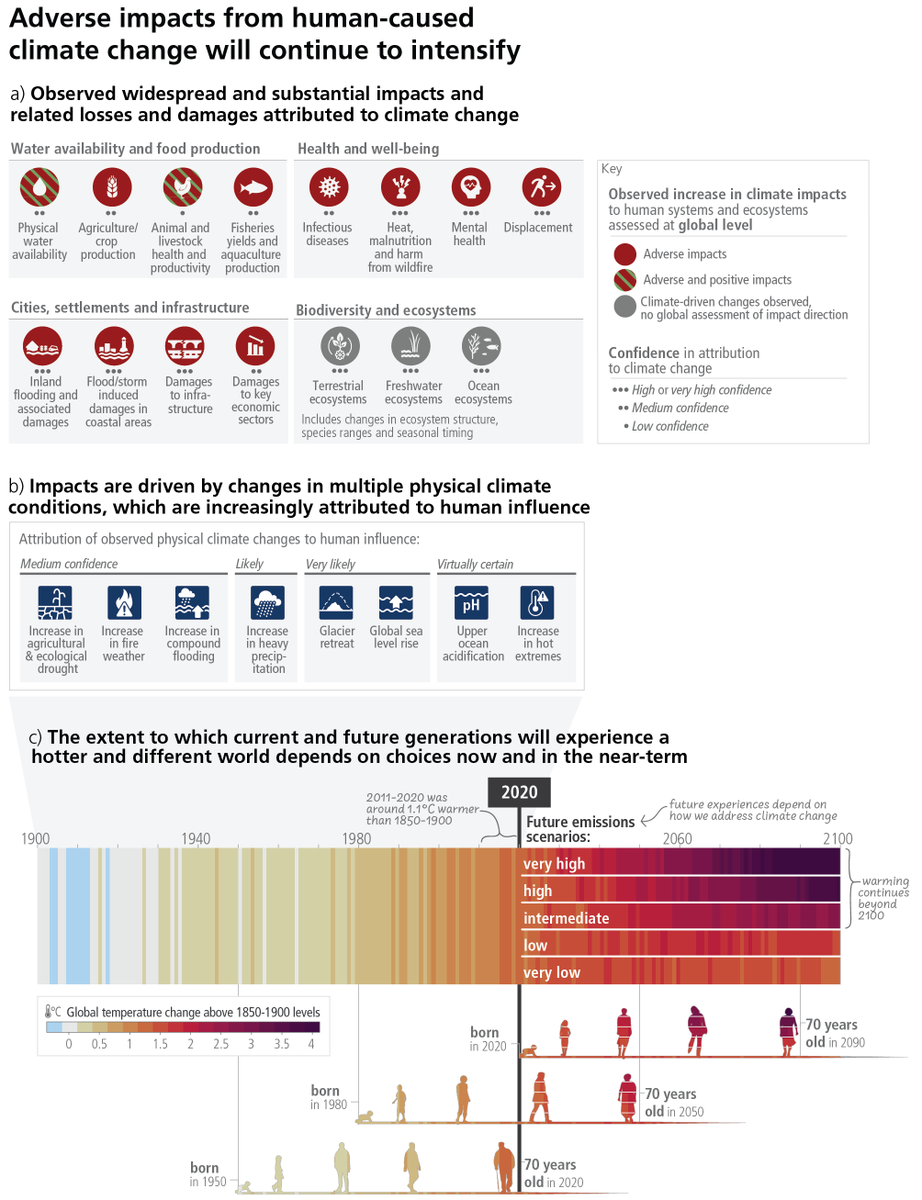"Why setting a #climate deadline is dangerous"
(and why it's problematic to claim "we only have 12 years left")
New @NatureClimate commentary, led by @ShinAsayama, with a team including @DrRobBellamy, @WarrenPearce, Mike Hulme and myself.
nature.com/articles/s4155…
#scipol #scicomm
(and why it's problematic to claim "we only have 12 years left")
New @NatureClimate commentary, led by @ShinAsayama, with a team including @DrRobBellamy, @WarrenPearce, Mike Hulme and myself.
nature.com/articles/s4155…
#scipol #scicomm

@NatureClimate @ShinAsayama @DrRobBellamy @WarrenPearce and now there's also the shareable "read only" link
rdcu.be/bLiok
rdcu.be/bLiok
@NatureClimate @ShinAsayama @DrRobBellamy @WarrenPearce When we wrote our @NatureClimate commentary (rdcu.be/bLiok) we thought readers would've many examples of failed #climate deadlines on their minds, and decided to skip that part.
But obviously, there's need for a SUB-THREAD ON EVIDENCE FOR FAILED CLIMATE DEADLINES [r1a)
But obviously, there's need for a SUB-THREAD ON EVIDENCE FOR FAILED CLIMATE DEADLINES [r1a)
While many older colleagues seem to like the piece (rdcu.be/bLiok) many of the younger discussants didn't seem to know to which pre-#IPCC #SR15 experience we draw upon. Others, irrespective of age, simply might not want to deal with uncomfortable knowledge [r1b]
Although there are many earlier examples, let's start with the '100 months' campaign that began in 2008, obvs. ended in 2016 and led Mike Hulme to write his first piece on 'deadline-ism' mikehulme.org/deadline-ism-w… (rdcu.be/bLiok) [1a]
Looking at @AndrewSimms_uk call for action theguardian.com/environment/20… you can imagine this being written in 2018 (just change 2C into 1.5C): "the IPCC says so", "time is running out". Well, time ran out (in 2016), but deadlines are still in fashion rdcu.be/bLiok) [1b]
@AndrewSimms_uk You can of course say that "100 months" was just a political campaign. But there's also a history of scientists setting #climate deadlines. Like the "St James Palace Memorandum" of Nobel Laureates in 2009, just before COP15. newscientist.com/wp-content/upl…
(rdcu.be/bLiok) [2a]
(rdcu.be/bLiok) [2a]
The "St James Palace Memorandum" explicity says that 2C "can only be achieved" by a global peak of GHG emissions by 2015. Yet, it did not happen. But signatories chose not to stick to their deadline afterwards.
newscientist.com/wp-content/upl…
(rdcu.be/bLiok) [2b]
newscientist.com/wp-content/upl…
(rdcu.be/bLiok) [2b]

Instead, some of the high-level signatories of the 2009 declaration came up with a new deadline in 2017 - now GHG emissions are said to need to peak by 2020. We have "Three years to safeguard our climate"
nature.com/news/three-yea…
(rdcu.be/bLiok) [3a]
nature.com/news/three-yea…
(rdcu.be/bLiok) [3a]
In a Twitter conversation about that article, co-author @rahmstorf promised he would personally call off the 2C target if emissions don't peak by 2020
(rdcu.be/bLiok) [3b]
https://twitter.com/rahmstorf/status/880419849293504513He later deleted that tweet
(rdcu.be/bLiok) [3b]
But the figure from said @nature article indicates several options how to extend that deadline again, first and foremost the size of the remaining carbon budget and the option to include net negative emissions
(rdcu.be/bLiok) [3c]
(rdcu.be/bLiok) [3c]
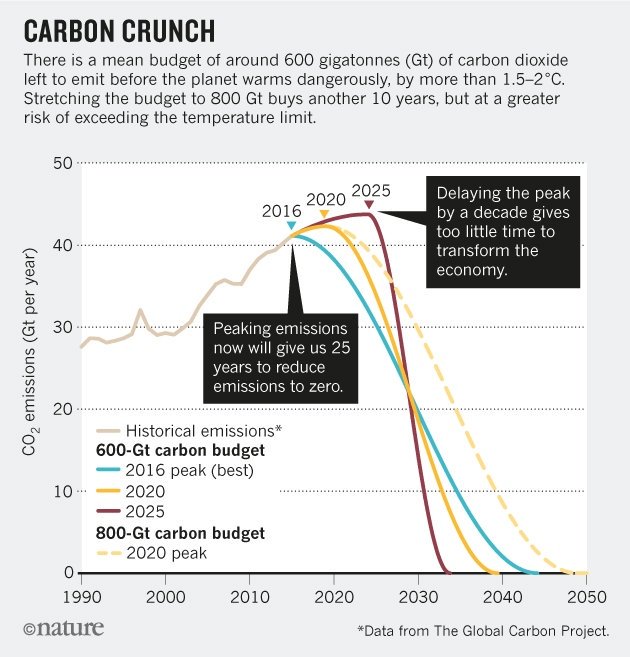
@AndrewSimms_uk ha, the link didn't work theguardian.com/environment/20…
@nature Before I continue: my apologies to @rahmstorf, he didn't delete the tweet, I didn't find it in my overcrowded deadlines folder
That's all I expect: if you set a deadline stick to it and say "game over" when deadline is missed (rdcu.be/bLiok) [3d]
https://twitter.com/rahmstorf/status/880417640635920385
That's all I expect: if you set a deadline stick to it and say "game over" when deadline is missed (rdcu.be/bLiok) [3d]

@NatureClimate @ShinAsayama @DrRobBellamy @WarrenPearce And here's another SUBTHREAD (ON CRITICISM AND INTERESTING FOLOW-UP QUESTIONS)
Never tried this format before, but seems an easier way to respond because otherwise it's going in circles.
And btw: I'm neither the lead nor the corresponding author (rdcu.be/bLiok) [r1]
Never tried this format before, but seems an easier way to respond because otherwise it's going in circles.
And btw: I'm neither the lead nor the corresponding author (rdcu.be/bLiok) [r1]
On the role of the IPCC (starting from here:
Of course the #IPCC is not to blame for the 2030 deadline language. Simply because #SR15 never set such a deadline. But it's hard to understand why IPCC never officially said so
(rdcu.be/bLiok) [1a]
https://twitter.com/BrigitteKnopf/status/1153985568151363587)
Of course the #IPCC is not to blame for the 2030 deadline language. Simply because #SR15 never set such a deadline. But it's hard to understand why IPCC never officially said so
(rdcu.be/bLiok) [1a]
Many #IPCC #SR15 authors have been unhappy about the 12 years claim, the most prominent one being Coordinating Lead Author Myles Allen (@ecioxford) , who wrote an excellent @ConversationUK piece about it theconversation.com/why-protesters…
(rdcu.be/bLiok) [1b]
(rdcu.be/bLiok) [1b]
Other #IPCC authors and co-chairs made statements on Twitter or responded individualy to media requests (when high level UN figures used the 12yrs claim) apnews.com/a0baaad17de744…
(rdcu.be/bLiok) [1c]
(rdcu.be/bLiok) [1c]
We just don't understand why the #IPCC can't issue a statement like "of course #climate change is urgent and we need to mitigate emissions as fast as we can, but there's no 2030 deadline and no 'game over' for climate policy.
(rdcu.be/bLiok) [1d]
(rdcu.be/bLiok) [1d]
Of course #IPCC cannot respond to every misrepresentation of its reports. But the ongoing debate shows that it is not enough to leave such statements to individual #IPCC #SR15 authors. To make it stick, it would have to come from the organisation
(rdcu.be/bLiok) [1e]
(rdcu.be/bLiok) [1e]
@nature @rahmstorf When I was younger, I expected scientists to stick to these kind of deadlines. That's what led me to say already in 2011 that 2C isn't feasible (which didn't make me a lot of friends, obvs.) (rdcu.be/bLiok) [r2a]
Then one day a modeller told me w/ a smile that they'll never call 2C off (no 1.5C scenarios back then), they'd just push more negative emissions into scenarios. It was meant as a joke, obvs., but it got me interested into deadline flexibilities (rdcu.be/bLiok) [r2b]
I found that there are many flexibilities that enable a constant shift of deadlines, modifying the meaning of 2C (or 1.5C), including lowering probabilities, allowing temporary overshoot, allowing more carbon removal.
swp-berlin.org/en/publication…
(rdcu.be/bLiok) [r2c]
swp-berlin.org/en/publication…
(rdcu.be/bLiok) [r2c]
All these modification options are not only threatening the integrity of climate policy, but also of scientific advice to climate policy (and eventually #climate research itself)
(rdcu.be/bLiok) [r2d]
(rdcu.be/bLiok) [r2d]
Here are some articles I wrote about deadline modifications (stemming of course from political inaction, but at the same time masking inaction)
nature.com/news/policy-cl…
onlinelibrary.wiley.com/doi/full/10.10…
nature.com/articles/s4156…
rdcu.be/0TiG
(rdcu.be/bLiok) [r2e]
nature.com/news/policy-cl…
onlinelibrary.wiley.com/doi/full/10.10…
nature.com/articles/s4156…
rdcu.be/0TiG
(rdcu.be/bLiok) [r2e]
But back to examples. Consider the annual UNEP Emissions Gap Report, analysing the pledges made in Copenhagen and compare the aggregate estimate with a 2C-compatible level (in 2020/2025/2030).
(rdcu.be/bLiok) [4a]
(rdcu.be/bLiok) [4a]
When UNEP started this effort in 2010 the Gap was already huge unenvironment.org/resources/emis…, and because of insufficient action, it grew over time, with the prospect that the Gap could never be closed by 2020.
(rdcu.be/bLiok) [4b]
(rdcu.be/bLiok) [4b]
While emissions kept rising, UNEP moved the goalposts, increasing emissions benchmark values, by introducing a new scenario category.
rdcu.be/0TiG
(rdcu.be/bLiok) [4c]
rdcu.be/0TiG
(rdcu.be/bLiok) [4c]
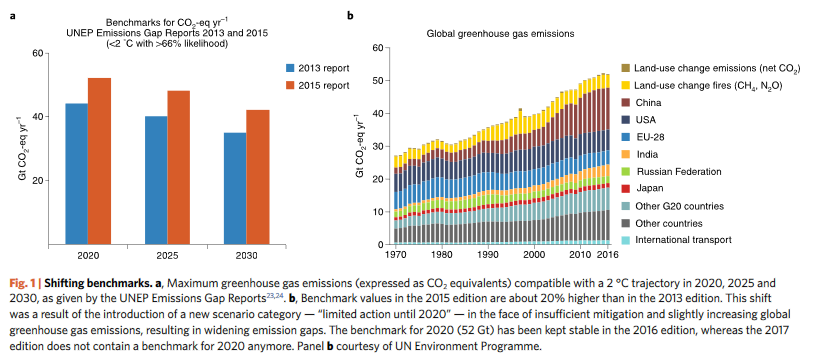
From a modelling perspective, such a change in methodology is perfectly fine, but used at the science/policy interface it leads to the impression among policymakers that it will always be five finutes to midnight
rdcu.be/0TiG
(rdcu.be/bLiok) [4d]
rdcu.be/0TiG
(rdcu.be/bLiok) [4d]
Before I go on a brief vacation, some words on the 1.5C targets and remaining carbon budgets. Many activists & policymakers treat budgets as if we deal with a calculation/methodology that never changes, e.g. @FridayForFuture
(rdcu.be/bLiok) [5a]
https://twitter.com/FridayForFuture/status/1144527222553960448
(rdcu.be/bLiok) [5a]
But in fact they change all the time (scientific progress is of course part of that story), but there are many different methodologies even today, as highlighted in this recent @nature paper by Rogelj et al. rdcu.be/bKIWi
(rdcu.be/bLiok) [5b]
(rdcu.be/bLiok) [5b]

Looking at remaining budget numbers today (420 Gt for 66% from 2018), these are the product of a changed methodology in #IPCC #SR15 that led to an extension of the budget by ~300Gt. Some scientists found that questionable, NGOs and activists didn't
(rdcu.be/bLiok) [5c]
(rdcu.be/bLiok) [5c]
Without that change in methodology (which I'm not an expert on - see maybe @Peters_Glen's blog cicero.oslo.no/no/posts/klima…) the 1.5C budget would almost be gone (below a figure with the old numbers. Of course, policymakers found that convenient
(rdcu.be/bLiok) [5d]
(rdcu.be/bLiok) [5d]
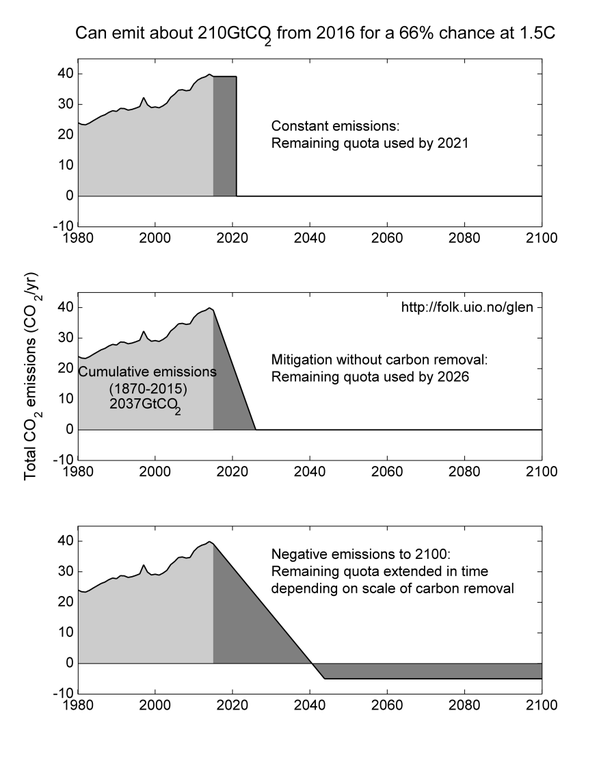
This move 'forced' (and I mean 'forced', because they didn't like it) organisations like @MCC_Berlin to reset their carbon clocks mcc-berlin.net/en/research/co… Of course they describe the methodology, but does the public (or activists) notice?
(rdcu.be/bLiok) [5e]
(rdcu.be/bLiok) [5e]
As a side effect, the budget for 2C also grew substantially. According to #SR15, the new net zero GHG year for 2C is now beyond 2100. And the new net zero GHG year for 1.5C is 2067 (not 2050, as often reported, that's CO2 only).
(rdcu.be/bLiok) [5f]
(rdcu.be/bLiok) [5f]
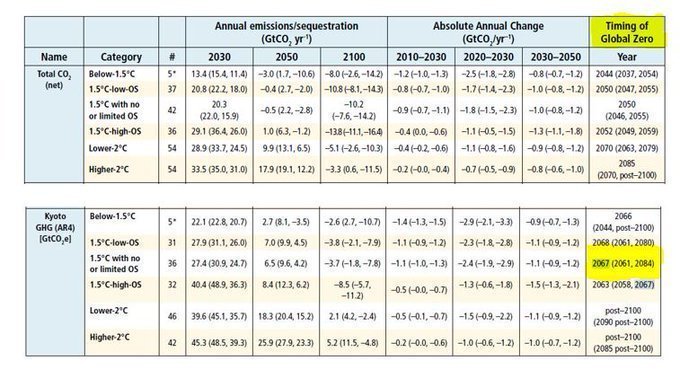
So, budget calculations do change, there's no "we only have 12 years left", and theoretically, it could also go the other way again. So maybe better focus on a target that isn't moving all the time: net zero (GHG) emissions kleinmanenergy.upenn.edu/policy-digests…
(rdcu.be/bLiok) [5g]
(rdcu.be/bLiok) [5g]
• • •
Missing some Tweet in this thread? You can try to
force a refresh




